Chuck has always been the picture of fortitude. But when the invisible wounds of war began to haunt him he would need the help of a four-legged friend to relearn the power of positive thinking.
From student to sailor
At the age of 20, Chuck enlisted in the Navy Reserves to help pay for college. For years he was a self-described ‘boat guy’ from SBT-12 and served in the Navy til 2005.
“I traveled everywhere with the Navy,” he says. “I enjoyed Australia, Singapore, and the Philippines the most.”
Many service members start to consider retirement as they approach 20 years of service; Chuck was nearing 17. However, hanging up his uniform was the furthest thing from his mind. His call to serve was stronger than ever in the aftermath of the 9/11 terrorist attacks in 2001.
A call to duty
In 2005 Chuck applied to the Army’s Inter-Service Transfer program. Formerly known as the Blue to Green Program, it allows service members to transition to active duty Army service from other military branches.
The remainder of Chuck’s career would be shaped by the events that transpired on and since 9/11.
“I liked the Army’s uniforms,” he says in partial jest, then admits, “and I wanted to go to Afghanistan.”
Chuck chose to train as an armored reconnaissance specialist. The recon scout was stationed in Schweinfurt, Germany with the 1-91 Cav, and deployed to Afghanistan in 2009.
The role of a cavalry scout is to obtain and distribute vital combat intelligence on the enemy. They have the daunting task of often being among the first personnel to patrol the battlefield.
A time to war and a time to heal
Chuck served as the non-commissioned officer in charge of electronic warfare for his team’s area of operations. The soldier worked closely with Army Green Berets in pursuit of high-value targets.
The war tempo was intense and the squadron was engaged in firefights nearly every day. Land mines and suicide bombers were a constant threat. Dozens of men in Chuck’s unit suffered serious physical wounds.
The veteran believes camaraderie and good leadership made the deployment successful. And the power of positive thinking – knowing that together they would prevail – was always top of mind.
“There were times that were scary, but there were times that it was pretty cool,” he recalls. “We were a small, close-knit group with an excellent platoon leader.”
After six years in the Army and 23 years of military service, Chuck decided to retire.
“My body was hurting. I got it out of my system. It was time to get out.”
“…more than just a bullet catcher”
Serving on the front lines can be fulfilling, but is not without risk for physical and emotional trauma. Since retiring, Chuck copes with the typical aches, pains, and fatigue that often accompany a long military career.
However, while Chuck was fortunate to avoid significant bodily injury, the invisible wounds of war would eventually wreak havoc on his mind.
Chuck has no regrets about the paths he chose. He does, however, have sage advice for the next generation of service members.
“Now,” he says, “I advise people going into the service to become more than just a bullet catcher. You want to have a job that you can do something with after you get out.”
The high costs of conflict
Witnessing wartime atrocities can significantly alter a combat veteran’s brain chemistry, something Chuck knows first hand. The retiree feels it is his duty to make sure potential recruits know the downside of certain military occupations.
“A lot of kids out there want to be in the infantry or want to become a scout. I don’t blame them. It is cool and it is prestigious,” he admits. “But there’s a cost.”
The price for the retired combat veteran is Post Traumatic Stress Disorder (PTSD) and depression.
The Department of Veterans Affairs (VA) estimates that between 11 and 20 percent of Iraq and Afghanistan war veterans have PTSD in a given year. Estimates for Vietnam veterans range as high as 30 percent.
Enduring a life-threatening situation activates the brain’s fight-or-flight response and floods the body with stress hormones. Prolonged exposure to these situations, such as Chuck’s deployment to Afghanistan, can cause the brain to get stuck in danger mode.
As a result, combat veterans may feel threatened and on edge even when not in actual danger.
PTSD symptoms vary widely among veterans. Many experience nightmares, flashbacks, and difficulty sleeping, concentrating, and remembering. More specific symptoms include avoidance of certain situations and being startled by loud noises.
Healing the invisible wounds of war
Chuck’s symptoms, though not always visible to others, caused significant disruption to his social and work lives. Eventually he received a VA disability rating of 90 percent.
Securing compensation for the debilitating service-connected impairment was only part of the battle, though. Chuck still had to learn how to live with the disorder and its many impacts.
There is no cure for PTSD, but there are various treatments and therapies that can help alleviate the symptoms.
Cognitive brain therapy is one such approach where veterans talk openly about their traumatic memories. They then learn coping skills to replace the negative thoughts and beliefs associated with those memories.
In simpler terms, veterans learn how to embrace the power of positive thinking.
The treatment Chuck receives through the VA helps him manage his PTSD and depression. At home, he has a supportive family and a couple of four-legged counselors. He is a lifelong dog lover and appreciates how his pups provide a natural form of therapy.
“Having a pet to take care of can help. Dogs are like living medicine,” he says.
The dogs give Chuck an outlet to redirect negative thoughts when they occur and help him maintain a purposeful routine. The simple act of watching them play together settles him down.
“It helps get my mind off what was stressing me out.”
Big things come in small packages
In April 2020, Chuck and his wife, Sabine, decided to add a third dog to their pack. The retired veteran works as a computer security architect for a convenience store chain in Delaware. He began teleworking during the COVID-19 quarantine.
Chuck noticed friction developing between his furry companions. He hoped adding a third dog would allay some of the bickering.
“My family loves animals, and we wanted to get another dog,” he says. “Our dogs weren’t getting along and the older one needed a friend.”
The couple visited Faithful Friends Animal Society in Wilmington, Delaware for a dog to unify their canine crew. The shelter joined our program in 2013 and waives adoption fees for veterans in our program.
Sabine was interested in adopting a Pitbull or Pitbull mix, but Chuck was “completely open to any dog.”
Tapper was a then four year-old terrier mix and the smallest dog at the shelter. Yet the pup made sure that he would not be overlooked and did not allow his diminutive size to diminish his prospects.
“He barked at us and jumped around like he was trying to get our attention,” Chuck recalls.
The couple continue to walk around and look at several other dogs. But Chuck was drawn to the way Tapper made himself stand out.
“When we came back to him, he was still sitting there looking at us,” he says. “It’s like he was saying to us, ‘Come on, I’m the one. I’m the one.’”
Chuck was certain that Tapper “fit the bill,” but wanted to be sure the entire family agreed. The couple returned with their children to visit the pint-sized pup later that same day.
“Everyone loved him,” Chuck shares. “And he just bonded with me completely.”
The pup and the power of positive thinking
Chuck was already familiar with Pets for Patriots and our mission to pair military veterans with overlooked homeless animals. He applied that afternoon at the shelter staff’s urging and was approved promptly.
In time the retired veteran would learn that Tapper had a rough life before his adoption. He was forced to fend for himself on the streets of Philadelphia before arriving at the shelter.
But no sooner did Tapper leave his hardscrabble existence behind than he made himself at home – immediately. He shows no signs of psychological trauma or fear of people. Unlike his new guardian, Tapper suffers no invisible wounds.
“He’s always trying his best to get up on the couch. He crawls into my lap and then snuggles into my chest,” Chuck says. “Tapper doesn’t discriminate, though. He’ll take his cuddles from anyone who wants to give them.”
Tapper loves snuggling with his humans and sleeping on his back with his tongue out due to his significant underbite. But the tiny terrier has taken on an outsized role in the household.
It is as though Tapper is undaunted at being the tiniest member of the family. Perhaps the pup employs his own power of positive thinking to rule his new roost.
“Tapper is the runt of our crew, but he has the most heart,” Chuck observes. “He brings life to everything here. He is the glue that brings everyone together.”
That crew now includes Luna, a puppy the family rescued shortly after adopting Tapper. While the two older dogs still squabble from time to time, the foursome is quite cohesive.
“…full of live and full of love”
Chuck is impressed with how quickly Tapper’s positive outlook on life united the squad. He is even more in awe of the big-hearted dog’s most precious gift – his innate ability to perceive when he is needed most.
“He can sense when someone is upset, and he gets very playful. He has a bark that says, ‘Hey, hey, look at me!’ Then he wants to go outside or wants to be chased.”
Chuck continues to struggle with negative thoughts related to his PTSD and depression. However, his pint-sized pup is helping him embrace the power of positive thinking, something that for most of his life came to him naturally.
Even the VA recognizes that dogs can help people living with PTSD by lessening stress and uplifting their mood.
“When I feel myself getting overly stressed, I can take the dogs out to the backyard to play,” Chuck says. “Watching them run around and wrestle with each other makes me happy. It calms me.”
The tiny dog has much to give and his comedic personality brings levity to Chuck’s days. He shines his light on the combat veteran’s dark moments and makes the hard days easier.
“Tapper is full of energy, full of life, and full of love. Everyone who meets him loves him.”


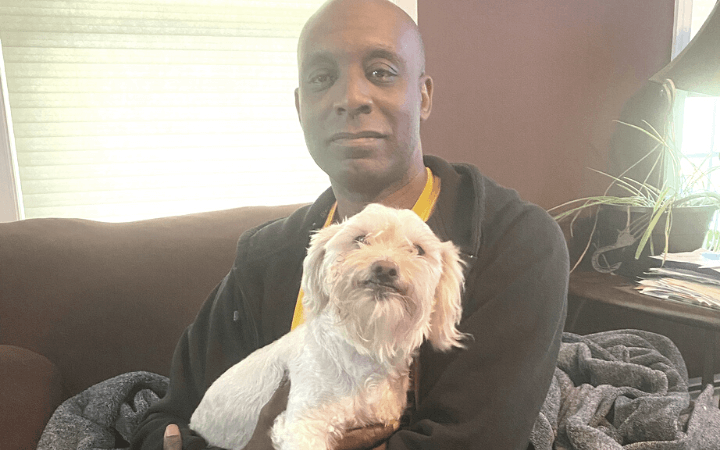
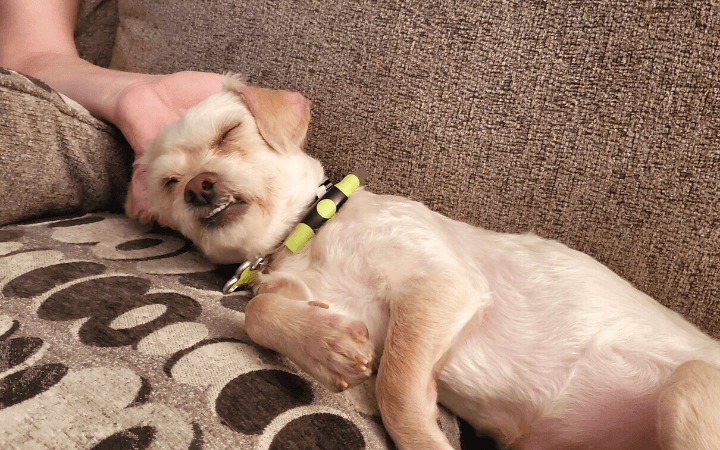
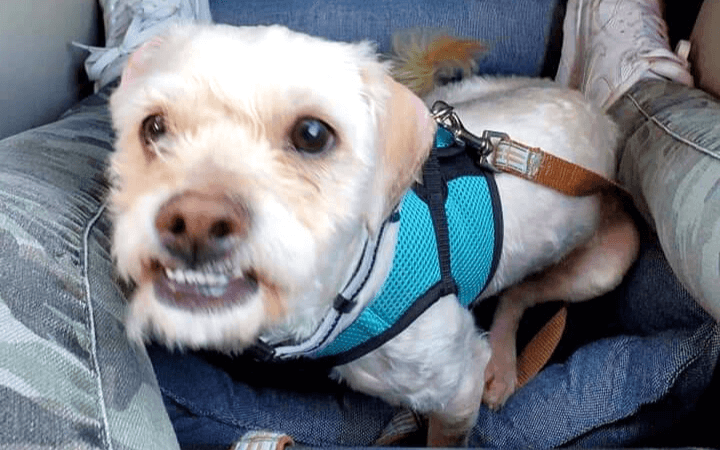
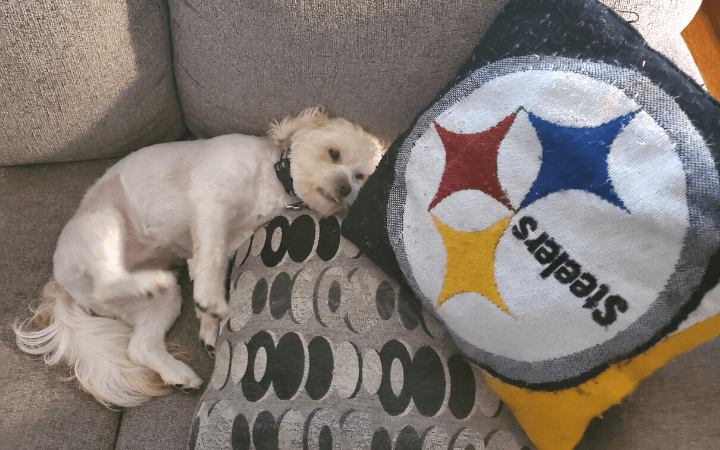
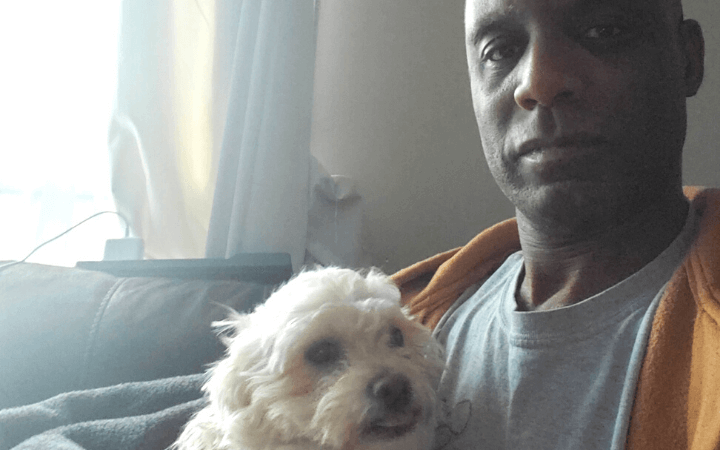


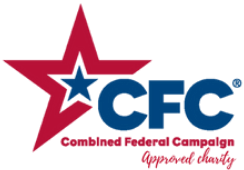






Thank you for your uplifting story, complete with a happy ending, as well as your years of military service. You’ve got yourself a houseful of support, it sounds like, both two legged and four!
Best wishes to you and yours.
So happy for Tapper & the whole Chuck bunch : )
Thank you so much for your service – Navy and Army – WOW! You are a true hero. Tapper knew your family was special – that’s why he chose you. Blessings to you all.